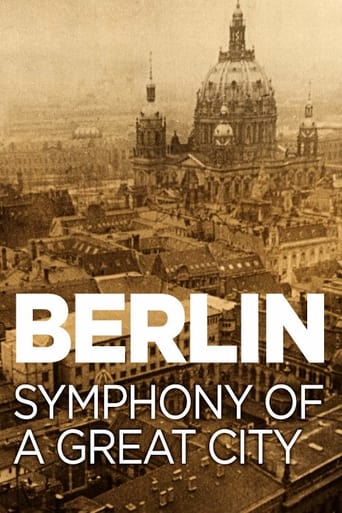MartinHafer
"Berlin: Symphony of a Great City" is an art film that is pretty dull. However, it certainly does have a lot of historical importance. After all, the film shows a typical day in this city circa 1927--and by the end of WWII, most of it had been destroyed. In other words, it allows the viewer and historians to look back to a city and way of life that are gone.As for the movie, though, I just can't see why it has a current high rating of 7.9. This is very high--especially when it's a film with no real plot and which many viewers will become bored with after a while. After all, it consists of hundreds of clips all strung together to tell a tale of the city during a day--and that is all. It's competently made and of passing interest only.I like art films and documentaries--but this is a case of too much.
peapulation
An amazing work of the 'slice of life' films of the 20s, really the main and most admirable example along with Dziga vertov's Man With the Movie Camera, to this day, the film remains an effective portrayal of the great city that Berlin was even back when the film was made. In fact, as time goes by, it picks up even greater importance because of the historical value that it holds.What is truly admirable is the editing and the cinematography. Perhaps even more than the things that are contained in the framework, is the framework itself which has the first impact on the viewer. The wonderful photography, and the skilled editing that is able to go from man to machine, from trains to horses, from workmen to roller-coaster rids, are always elegant and original, even in regards to Vertov's later work mentioned above. It is, in fact, stylistically a Ruttmann work. Although the work of Vertov and Ruttmann are similar, there is a difference in the sense that while The man With the Movie Camera is aware of being a film, and plays with the process of film-making, Berlin actually lets the contents of the framework play out, and never quite interferes with it.
TooShortforThatGesture
One can understand why this film might be important to the development of a certain film aesthetic. One can understand why it might have been interesting to view back in its day. But (much like Vertov's Man with a Movie Camera) I found it dull to watch today. Much early 20th-century fascination with large machinery, lots of shots alluding to "man as cog in the machine" Leninism, etc etc etc. And, as someone else here has noted, a number of the the "documentary" shots were clearly staged, which undercuts somewhat the life-on-the-street feeling the film is trying to convey.It is somewhat interesting to see pre-WW2 Berlin, but the editing moves so quickly that one really can't get a good sense of the city. I understand that, arguably, that was part of the point -- e.g. that all cities are the same, but being able to really look at pre-war Berlin might have made it a more intriguing film today.Overall, to me at least, it felt too much like a series of nickelodeon shorts pieced together for a false, or at least dated, effect.
Gonzo-12
Ruttman's film is a spellbinding tour-de-force in photography, managing to dazzle the viewer with each shot. Not a frame is wasted in this, the most photographically influential film ever.

